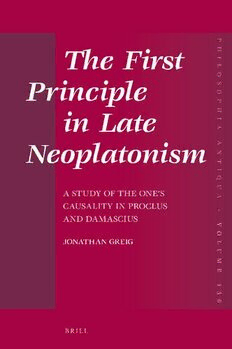
The First Principle in Late Neoplatonism: A Study of the One's Causality in Proclus and Damascius PDF
Preview The First Principle in Late Neoplatonism: A Study of the One's Causality in Proclus and Damascius
The First Principle in Late Neoplatonism Philosophia Antiqua A Series of Studies on Ancient Philosophy Editorial Board C.J. Rowe (Durham) K.A. Algra (Utrecht) F.A.J. de Haas (Leiden) J. Mansfeld (Utrecht) D.T. Runia (Melbourne) Ch. Wildberg (Princeton) Previous Editors J.H. Waszink† W.J. Verdenius† J.C.M. Van Winden† volume 156 The titles published in this series are listed at brill.com/ pha The First Principle in Late Neoplatonism A Study of the One’s Causality in Proclus and Damascius By Jonathan Greig LEIDEN | BOSTON Funding: ERC project, ‘NeoplAT’ (ERC_ CoG_ 771640), begun 2019. Library of Congress Cataloging-in-Publication Data Names: Greig, Jonathan, author. Title: The first principle in late Neoplatonism : a study of the one’s causality in Proclus and Damascius / by Jonathan Greig. Description: Leiden ; Boston : Brill, [2021] | Series: Philosophia antiqua : a series of studies on ancient philosophy, 0079-1687 ; volume 156 | Revision of author’s thesis (doctoral)–Universität München, 2017. | Includes bibliographical references and index. Identifiers: LCCN 2020030423 | ISBN 9789004439054 (hardback) | ISBN 9789004439092 (ebook) Subjects: LCSH: Proclus, approximately 410-485. | Damaskios, approximately 480-approximately 550. | Causation. | First philosophy. | One (The One in philosophy) | Neoplatonism. Classification: LCC BD531 .G74 2021 | DDC 186/.4–dc23 LC record available at https://lccn.loc.gov/2020030423 Typeface for the Latin, Greek, and Cyrillic scripts: “Brill”. See and download: brill.com/b rill- typeface. issn 0079-1 687 isbn 978-9 0-0 4-4 3905-4 (hardback) isbn 978-9 0-0 4-4 3909-2 (e- book) Copyright 2021 by Koninklijke Brill NV, Leiden, The Netherlands. Koninklijke Brill NV incorporates the imprints Brill, Brill Hes & De Graaf, Brill Nijhoff, Brill Rodopi, Brill Sense, Hotei Publishing, mentis Verlag, Verlag Ferdinand Schöningh and Wilhelm Fink Verlag. All rights reserved. No part of this publication may be reproduced, translated, stored in a retrieval system, or transmitted in any form or by any means, electronic, mechanical, photocopying, recording or otherwise, without prior written permission from the publisher. Requests for re-use and/or translations must be addressed to Koninklijke Brill NV via brill.com or copyright.com. This book is printed on acid- free paper and produced in a sustainable manner. To my parents, Gary and Catherine, with love and gratitude ∵ ἀλλ’ ὅταν εἰς αὐτὸν ἴδωμεν, τότε ἡμῖν τέλος καὶ ἀνάπαυλα καὶ τὸ μὴ ἀπᾴ- δειν χορεύουσιν ὄντως περὶ αὐτὸν χορείαν ἔνθεον. plotinus, Ennead vi.9.8, 43– 45 ∵ Contents Acknowledgements xi Preface xiii Introduction 1 1 The Background to Proclus and Damascius 25 1.1 Plotinus 26 1.1.1 The One as Anticipating Intellect’s Nature 35 1.2 Porphyry 41 1.2.1 The Anonymous Parmenides Commentary 47 1.2.2 Assessing Porphyry and the Anonymous Commentary in Light of Plotinus 54 1.3 Iamblichus 55 1.4 Conclusion: Syrianus’ Transformation as the Foundation for Proclus and Damascius 69 2 Proclus’ Causal Framework 73 2.1 The Building Blocks of Causality in Proclus 76 2.1.1 The Cause as Greater Than Its Effect 79 2.1.2 ἐνέργεια, δύναμις, and Causal Synonymy in Proclus 90 2.1.3 Productive Causes and Two Kinds of Intermediaries 97 2.2 Unparticipated and Participated Causes 99 2.2.1 Participated Causes as Relative to Participants: Proclus’ Shift from Plotinus 102 2.2.2 Relating Unparticipated Causes with Participants 105 2.3 The Derivation of Participated Entities and Lower Levels from the Unparticipated 111 2.4 Conclusion 116 3 Damascius’ Causal Framework 118 3.1 Synonymy in Causal Relations 120 3.2 Causal Synonymy and Similar/ Dissimilar Effects 128 3.3 Unparticipated Causality and Self- Constitution 138 3.3.1 Self- Constitution and Reversion 138 3.3.2 Unparticipated/ Participated Causality 145 3.4 Conclusion 152 viii Contents 4 Proclus on the One’s Causality 154 4.1 Proclus’ Proofs for the One 156 4.1.1 et Prop. 1– 4: Unity as an Ontological Component 159 4.1.2 et Prop. 5: the One as Unparticipated 162 4.1.3 et Prop. 6: the One’s Causality Delegated to the Henads 166 4.1.4 Putting Proclus’ One in Perspective 169 4.2 The One within Proclus’ Causal Framework 170 4.2.1 Proclus’ Causal Model in Response to the Plotinian Model 173 4.2.2 The One’s Causality Indicated in Negations 178 4.2.3 The One and Matter 181 4.3 The Henads as Participated Causes of the One 186 4.3.1 Distinguishing the Henads 186 4.3.2 The Henads’ Derivation from the One 193 4.3.3 Orders of the Henads, and the Limit/ Unlimited 197 4.4 The Limit and Unlimited: a Second Participated Model? 202 4.4.1 The One and the Limit/ Unlimited in pt iii.8– 9 208 4.5 Reconciling Causal Models, and a Remaining Impasse 213 4.6 Conclusion: Assessing Proclus’ Framework for the One 217 5 Damascius on the One’s Causality and the Ineffable 219 5.1 Causal Synonymy and the One 222 5.1.1 The First Aporia in dp i,1– 2: the One as Coordinated with τὰ πάντα 224 5.1.2 The One’s Causal Synonymy with τὰ πάντα 231 5.1.3 Damascius’ Response to Proclus against the One as τὰ πάντα 236 5.2 Causal Synonymy, and the One- All, All- One, and the Unified 243 5.2.1 The Undetermined- Determined Distinction in the One (dp i, 94– 98) 244 5.2.2 Τhe One Distinguished as Remaining, Procession, Reversion κατὰ ἀναλογίαν 257 5.2.3 Damascius’ Assessment of the Iamblichean/ Proclean Interpretations of the Limit/ Unlimited 265 5.2.4 The One Differentiated into the One- All, All- One, Unified 272 5.2.5 Summing Up Damascius’ Structural Changes 275 5.3 The Ineffable: Separating Causal Synonymy and the ἀρχή 277 5.3.1 Distinguishing the Ineffable in Speech 279 5.3.2 The Three ‘Ascents’ to the First Principle 282 Contents ix 5.3.3 The Ineffable as the Grounding Principle of the One 291 5.3.4 The ‘Superfluous Reading’: Objections to Damascius’ Ineffable, and the Ineffable’s Role 298 5.4 Conclusion: Assessing Damascius’ Transformation 304 Conclusion 308 Bibliography 315 Index Locorum 331 Index Rerum 340
